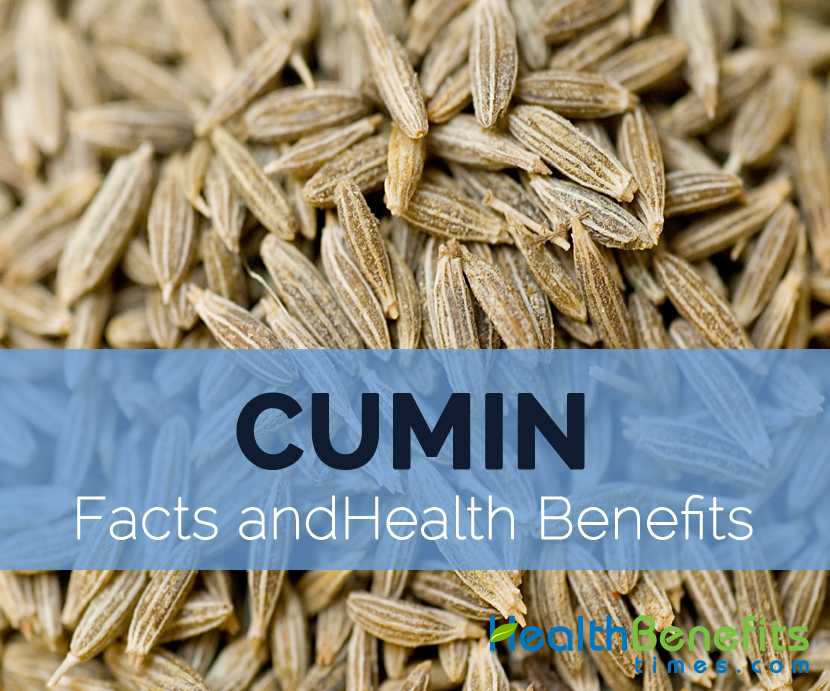| Cumin Quick Facts | |
|---|---|
| Name: | Cumin |
| Scientific Name: | Cuminum cyminum L. |
| Origin | East Mediterranean and India, also cultivated in Asia, Europe, North Africa, the Middle East, Iran and India |
| Colors | Yellow to brown |
| Shapes | Small, slender, oblong, curved |
| Taste | Coarse |
| Calories | 22 Kcal Kcal./cup |
| Major nutrients | Iron (49.75%) Manganese (8.70%) Copper (5.78%) Calcium (5.60%) Magnesium (5.24%) |
| Health benefits | Antioxidants, Antimicrobial activity, Anticancer activity, Antiplatelet Activity, Antitussive Activity |
| More facts about Cumin | |
History
Cumin is native to the East Mediterranean and India. But nowadays it is also cultivated in the North Africa, Middle East, Iran and India. Since ancient times, cumin is being used. Egyptians used the cumin in the form of spice. The cumin was introduced by the Portuguese and Spanish colonist to America.
Plant
The cultivation of cumin is well suited to a Mediterranean climate. The plant prefers fertile and well-drained soil. The plant grows upto the height of 30–50 cm (12–20 inch). Small white or pink flowers appear on the umbels in the shape of an oblong or ovate. Each branch of the plant possesses 2-3 sub branches. The stems are grey or dark green in color. The leaves of the cumin plant are bipinnate or pinnate with length 5-10 cm (2-4 inches) and possess leaflets like threads.
Seeds
The cumin flower yields a small, slender, oblong, curved seeds which is yellow to brown in color. It has strong and distinct flavor with warm aroma. It has a coarse taste. It is grown during spring season. It is found annually.
Nutritional Value
One table spoon of cumin seed contains 22 calories, 1.07 g of protein, 1.34 grams of fat, 2.65 g of carbohydrate which includes 0.6 g of fiber and 0.14 grams of sugar. The same tablespoon serving provides 0.25 % of vitamin K, 49.75% iron, 5.60% of calcium and 0.56% of vitamin C.
Health Benefits of Cumin
- Great source of antioxidants
Nine types of antioxidants are present in cumin which includes Manganese, Copper, Zinc, Selenium, Vitamin E, Vitamin C, Lutein, Vitamin B9 and Beta Carotene. It possesses the antimicrobial and antiparasitic properties which is effective for curing the fever. It eliminates the oxidative stress and inhibits diseases. Cumin is also used for treating the diseases such as vitiligo and hyperglycemia.
http://www.eurekalert.org/pub_releases/2011-05/bc-ttr051811.php
2. Antimicrobial activity
The essential oil which is extracted from the cumin fruit restricts the antifungal activity adjacent to yeast and dermatophytes. The dose of 5 ml. eliminated the fungus named Trichophyton rubrum. It is less obstructable for the phytopathogens.
- Anticancer activity
The research suggests that the presence of chemopreventive properties helps to balance the metabolism of carcinogen. The Hela cells were destructed by 79% with the 0.1 m L/mL of concentration. The cytotoxic activity was contributed by the antioxidant activity. When the study on subchronic toxicity was conducted on the rats, it showed that there was decrease in WBC by 25.55%, hemoglobin, hematrocrit by 14.24% and platelets count was increased by 108.81%.
- Hepatoprotective Activity
Cumin raised the decreased level of phospholipase and phospholipids activity in the kidney and livers. The study shows that the cumin has the ability to reduce the level of lipid in oxidized oil and alcohol which also helps to persuade hepatotoxicity.
- Gastroprotective Activity
The extract of cumin raises the secretion of acid by the mechanism of cholinergic. Its extract also raises the secretion of gastric acid in stomach along with the aspirin promoted the injury of mucos.
- Nephroprotective Activity
The extracts of cumin seeds provide the protection adjacent to the gentamicin urged the nephrotoxicity. The use of 200 mg/kg of cumin extract reduced the gentamicin and also promoted the serum urea levels, lipid peroxidation, creatinine and raises the urea clearance and creatinine.
- Antidiabetic and Antiphyperlipidemic/ Antihyperchlolesterolemic Activities
The cumin powder reduces the glucosuria and hyperglycemia. The cumin also prohibited the alterations of metabolic caused by the reduced level of blood urea and urea excretions as well as creatinine. Cumin also lowered the cholesterol, free fatty acids, phospholipids and triglycerides of tissue and plasma.
- Antiplatelet Activity
The extract of ethereal of turmeric and cumin restricted the arachidonate which promotes the aggregate of platelet. These extracts prevented the production of thromboxane B2 from exogenous arachidonic acid.
- Osteoprotective Activity
The extract of cumin helps to upgrade the bone’s microarchitecture. It also inhibits the ovariectomy which persuades the loss of bone with no effect of anabolic on the atrophic uterus of rats.
- Antitussive Activity
The study shows that the extract of cumin has an antitussive effect. The guinea pigs when exposed to aerosols, it lowered the cough number.
https://www.youtube.com/watch?v=NajsRyCs7xs
How to eat
The grounded cumin could be added to the sauted or roasted veggies. It could be used to make guacamole or hummus. The warm beverage could be made by adding the cumin seeds in the boiling water and let it steep for about 10 minutes. It could also be sprinkled over the healthy snacks or nuts. It also adds the spice to the lentil soup.
Precautions
It is not recommended to use the cumin by the breast feeding and pregnant women. Cumin could also reduce the blood sugar and slow down the blood clotting. Cumin interact with the medications (antidiabetes drugs) of diabetes. One should consult the professional physician or pharmacist before using cumin.
Comments
comments
